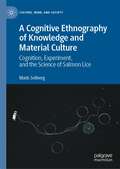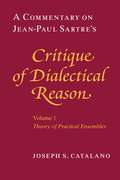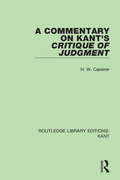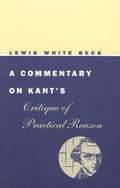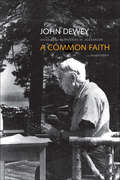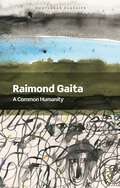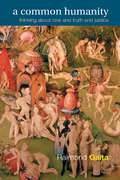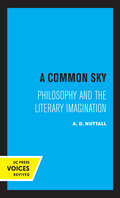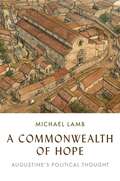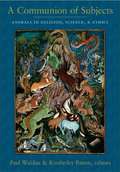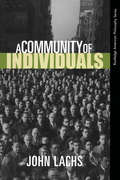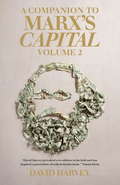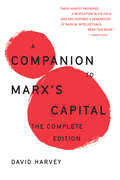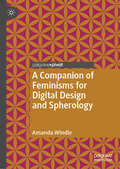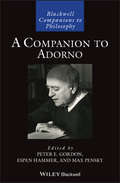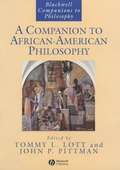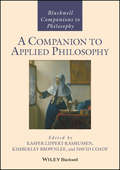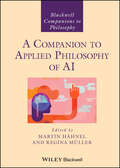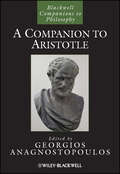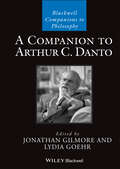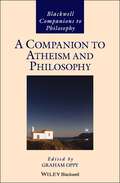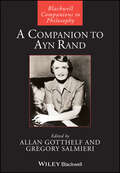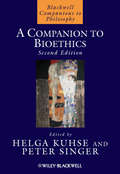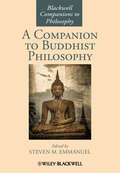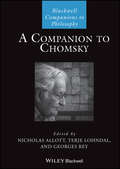- Table View
- List View
A Cognitive Ethnography of Knowledge and Material Culture: Cognition, Experiment, and the Science of Salmon Lice (Culture, Mind, and Society)
by Mads SolbergThis cognitive ethnography examines how scientists create meaning about biological phenomena through experimental practices in the laboratory, offering a frontline perspective on how new insights come to life. An exercise in the anthropology of knowledge, this story follows a community of biologists in Western Norway in their quest to build a novel experimental system for research on Lepeoptheirus salmonis, a parasite that has become a major pest in salmon aquaculture. The book offers a window on the making of this material culture of science, and how biological phenomena and their representations are skillfully transformed and made meaningful within a rich cognitive ecology. Conventional accounts of experiments see their purpose as mainly auxiliary, as handmaidens to theory. By looking closely at experimental activities and their materiality, this book shows how experimentation contributes to knowledge production through a broader set of epistemic actions.In drawing on a combination of approaches from anthropology and cognitive science, it offers a unique contribution to the fields of cultural psychology, psychological anthropology, science and technology studies and the philosophy of science.
A Commentary on Jean-Paul Sartre's Critique of Dialectical Reason: Theory Of Practical Ensembles (Theory of Practical Ensembles)
by Joseph S. CatalanoSartre’s Critique of Dialectical Reason ranks with Being and Nothingness as a work of major philosophical significance, but it has been largely neglected. The first volume, published in 1960, was dismissed as a Marxist work at a time when structuralism was coming into vogue; the incomplete second volume has only recently been published in France. In this commentary on the first volume, Joseph S. Catalano restores the Critique to its deserved place among Sartre’s works and within philosophical discourse as a whole. Sartre attempts one of the most needed tasks of our times, Catalano asserts—the delivery of history into the hands of the average person. Sartre’s concern in the Critique is with the historical significance of everyday life. Can we, he asks, as individuals or even collectively, direct the course of our history? A historical context for our lives is given to us at birth, but we sustain that context with even our most mundane actions—buying a newspaper, waiting in line, eating a meal. In looking at history, Sartre argues, reason can never separate the historical situation of the investigator from the investigation. Thus reason falls into a dialectic, always depending upon the past for guidance but always being reshaped by the present. Clearly showing the influence of Marx on Sartre’s thought, the Critique adds the historical dimension lacking in Being and Nothingness. In placing the Critique within the corpus of Sartre’s philosophical writings, Catalano argues that it represents a development rather than a break from Sartre’s existentialist phase. Catalano has organized his commentary to follow the Critique and has supplied clear examples and concrete expositions of the most difficult ideas. He explicates the dialogue between Marx and Sartre that is internal to the text, and he also discusses Sartre’s Search for Method, which is published separately from the Critique in English editions.
A Commentary on Kant's Critique of Judgement (Routledge Library Editions: Kant)
by H. W. CassirerThis book expounds Kant's Critique of Judgement by interpreting all the details in the light of what Kant himself declares to be his fundamental problem. Providing an excellent introduction to Kant's third critique, it will be of interest to students of philosophy.
A Commentary on Kants Critique of Practical Reason
by Lewis Beck<p>When this work was first published in 1960, it immediately filled a void in Kantian scholarship. It was the first study entirely devoted to Kant's Critique of Practical Reason and by far the most substantial commentary on it ever written. This landmark in Western philosophical literature remains an indispensable aid to a complete understanding of Kant's philosophy for students and scholars alike. <p>This Critique is the only writing in which Kant weaves his thoughts on practical reason into a unified argument. Lewis White Beck offers a classic examination of this argument and expertly places it in the context of Kant's philosophy and of the moral philosophy of the eighteenth century.</p>
A Common Faith
by John Dewey Thomas M. AlexanderIn "A Common Faith, " eminent American philosopher John Dewey calls for the "emancipation of the true religious quality" from the heritage of dogmatism and supernaturalism that he believes characterizes historical religions. He describes how the depth of religious experience and the creative role of faith in the resources of experience to generate meaning and value can be cultivated without making cognitive claims that compete with or contend with scientific ones. <P><P> In a new introduction, Dewey scholar Thomas M. Alexander contextualizes the text for students and scholars by providing an overview of Dewey and his philosophy, key concepts in "A Common Faith, " and reactions to the text.
A Common Humanity: Thinking About Love and Truth and Justice (Routledge Classics)
by Raimond GaitaHolocaust denial, racism, genocide of indigenous peoples and the long-lasting harms inflicted by colonialism pose deep challenges to any idea of a common humanity. How can we include these and countless other examples of evil within our vision of a shared morality? These painful human incongruities are precisely what Raimond Gaita boldly harmonises in A Common Humanity. He discusses the complex and often fraught relations between hatred and forgiveness, evil and love, suffering and compassion, the mundane and the precious.Gaita asserts that our conception of humanity cannot be based upon the thin language of individual rights when it is our shared feelings of grief, hope, love, guilt, shame and remorse that offer a more potent foundation for common understanding.Drawing on the work of Hannah Arendt, Simone Weil, Primo Levi and Iris Murdoch, amongst others, Gaita creates a beautifully written and provocative new picture of our common humanity.This Routledge Classics edition includes a new Preface and a substantial Afterword by the author, in which he revisits some of the main themes of A Common Humanity and engages with responses to it since it was first published.
A Common Humanity: Thinking about Love and Truth and Justice
by Raimond GaitaThe Holocaust and attempts to deny it, racism, murder, the case of Mary Bell. How can we include these and countless other examples of evil within our vision of a common humanity? These painful human incongruities are precisely what Raimond Gaita boldly harmonizes in his powerful new book, A Common Humanity.Hatred with forgiveness, evil with love, suffering with compassion, and the mundane with the precious. Gaita asserts that our conception of humanity cannot be based upon the empty language of individual rights when it is our shared feelings of grief, hope, love, guilt, shame and remorse that offer a more potent foundation for common understanding. Drawing on the work of Hannah Arendt, Simon Weil, Primo Levi, George Orwell, Iris Murdoch and Sigmund Freud, Gaita creates a beautifully written and provocative new picture of our common humanity.
A Common Sky: Philosophy and the Literary Imagination
by A.D. NuttallThis title is part of UC Press's Voices Revived program, which commemorates University of California Press’s mission to seek out and cultivate the brightest minds and give them voice, reach, and impact. Drawing on a backlist dating to 1893, Voices Revived makes high-quality, peer-reviewed scholarship accessible once again using print-on-demand technology. This title was originally published in 1974.
A Commonwealth of Hope: Augustine's Political Thought
by Michael LambA bold new interpretation of Augustine&’s virtue of hope and its place in political lifeWhen it comes to politics, Augustine of Hippo is renowned as one of history&’s great pessimists, with his sights set firmly on the heavenly city rather than the public square. Many have enlisted him to chasten political hopes, highlighting the realities of evil and encouraging citizens instead to cast their hopes on heaven. A Commonwealth of Hope challenges prevailing interpretations of Augustinian pessimism, offering a new vision of his political thought that can also help today&’s citizens sustain hope in the face of despair.Amid rising inequality, injustice, and political division, many citizens wonder what to hope for in politics and whether it is possible to forge common hopes in a deeply polarized society. Michael Lamb takes up this challenge, offering the first in-depth analysis of Augustine&’s virtue of hope and its profound implications for political life. He draws on a wide range of Augustine&’s writings—including neglected sermons, letters, and treatises—and integrates insights from political theory, religious studies, theology, and philosophy. Lamb shows how diverse citizens, both religious and secular, can unite around common hopes for the commonwealth.Recovering this understudied virtue and situating Augustine within his political, rhetorical, and religious contexts, A Commonwealth of Hope reveals how Augustine&’s virtue of hope can help us resist the politics of presumption and despair and confront the challenges of our time.
A Communion of Subjects: Animals in Religion, Science, and Ethics
by Kimberley Patton Paul Waldau Eds.A Communion of Subjects is the first comparative and interdisciplinary study of the conceptualization of animals in world religions. Scholars from a wide range of disciplines, including Thomas Berry (cultural history), Wendy Doniger (study of myth), Elizabeth Lawrence (veterinary medicine, ritual studies), Marc Bekoff (cognitive ethology), Marc Hauser (behavioral science), Steven Wise (animals and law), Peter Singer (animals and ethics), and Jane Goodall (primatology) consider how major religious traditions have incorporated animals into their belief systems, myths, rituals, and art. Their findings offer profound insights into humans' relationships with animals and a deeper understanding of the social and ecological web in which we all live.Contributors examine Judaism, Christianity, Islam, Hinduism, Buddhism, Jainism, Daoism, Confucianism, African religions, traditions from ancient Egypt and early China, and Native American, indigenous Tibetan, and Australian Aboriginal traditions, among others. They explore issues such as animal consciousness, suffering, sacrifice, and stewardship in innovative methodological ways. They also address contemporary challenges relating to law, biotechnology, social justice, and the environment. By grappling with the nature and ideological features of various religious views, the contributors cast religious teachings and practices in a new light. They reveal how we either intentionally or inadvertently marginalize "others," whether they are human or otherwise, reflecting on the ways in which we assign value to living beings. Though it is an ancient concern, the topic of "Religion and Animals" has yet to be systematically studied by modern scholars. This groundbreaking collection takes the first steps toward a meaningful analysis.
A Community of Individuals
by John LachsFirst published in 2003. Routledge is an imprint of Taylor & Francis, an informa company.
A Companion To Marx's Capital, Volume 2
by David HarveyThe biggest financial crisis since the Great Depression shows no sign of coming to a close and Marx's work remains key in understanding the cycles that lead to recession. For nearly forty years, David Harvey has written and lectured on Capital, becoming one of the world's most foremost Marx scholars.Based on his recent lectures, and following the success of his companion to the first volume of Capital, Harvey turns his attention to Volume 2, aiming to bring his depth of learning to a broader audience, guiding first-time readers through a fascinating and hitherto neglected text. Whereas Volume 1 focuses on production, Volume 2 looks at how the circuits of capital, the buying and selling of goods, realize value.This is a must-read for everyone concerned to acquire a fuller understanding of Marx's political economy.
A Companion To Marx's Capital: The Complete Edition
by David HarveyThe radical geographer guides us through the classic text of political economy."My aim is to get you to read a book by Karl Marx called Capital, Volume 1, and to read it on Marx's own terms..." The biggest financial crisis since the Great Depression has generated a surge of interest in Marx's work in the effort to understand the origins of our current predicament. For nearly forty years, David Harvey has written and lectured on Capital, becoming one of the world's most foremost Marx scholars. Based on his recent lectures, this current volume aims to bring this depth of learning to a broader audience, guiding first-time readers through a fascinating and deeply rewarding text. A Companion to Marx's Capital offers fresh, original and sometimes critical interpretations of a book that changed the course of history and, as Harvey intimates, may do so again.
A Companion of Feminisms for Digital Design and Spherology
by Amanda Windle<p>This book questions if spherology is a philosophy for designers, giving guidance on ways to read Spheres, how to approach the trilogy’s indexicality, and apply the key tropes and ethics of atmospheres to digital design. Each chapter includes a design-in, that is a practical entry point into the many tropes of Spheres including― bubbles, globes and foam. The book also applies spherology to an atmosphere design issue involving endangered species and geospatial threats to the environment. <p>Spherology refers to the Spheres trilogy by the philosopher Peter Sloterdijk, which traces spherical ideas, theories, sensations and feelings related to the philosophical concept of ‘being’ and the human-centered position of ‘being-in’. It is the first cynical, feminist companion of spherology to take a practice-led approach and to cover all three controversial volumes to with and against Spheres. Windle draws on feminist science and technology studies (STS) through parody within reading, writing and design practices. Design provides navigation so that academics and students can engage with spherology through an embodied concern with digital materiality. <p>As a feminist companion for today’s design issues, the book is an essential read for feminist STS scholars, design practitioners and digital R&D specialists working both in industry and academia, including more specifically data visualisers, interface and interaction designers.</p>
A Companion to Adorno (Blackwell Companions to Philosophy)
by Espen Hammer Peter E. Gordon Max PenskyA definitive contribution to scholarship on Adorno, bringing together the foremost experts in the field As one of the leading continental philosophers of the last century, and one of the pioneering members of the Frankfurt School, Theodor W. Adorno is the author of numerous influential—and at times quite radical—works on diverse topics in aesthetics, social theory, moral philosophy, and the history of modern philosophy, all of which concern the contradictions of modern society and its relation to human suffering and the human condition. Having authored substantial contributions to critical theory which contain searching critiques of the ‘culture industry’ and the ‘identity thinking’ of modern Western society, Adorno helped establish an interdisciplinary but philosophically rigorous study of culture and provided some of the most startling and revolutionary critiques of Western society to date. The Blackwell Companion to Adorno is the largest collection of essays by Adorno specialists ever gathered in a single volume. Part of the acclaimed Blackwell Companions to Philosophy series, this important contribution to the field explores Adorno’s lasting impact on many sub-fields of philosophy. Seven sections, encompassing a diverse range of topics and perspectives, explore Adorno’s intellectual foundations, his critiques of culture, his views on ethics and politics, and his analyses of history and domination. Provides new research and fresh perspectives on Adorno’s views and writings Offers an authoritative, single-volume resource for Adorno scholarship Addresses renewed interest in Adorno’s significance to contemporary questions in philosophy Presents over 40 essays written by international-recognized experts in the field A singular advancement in Adorno scholarship, the Companion to Adorno is an indispensable resource for Adorno specialists and anyone working in modern European philosophy, contemporary cultural criticism, social theory, German history, and aesthetics.
A Companion to African-american Philosophy
by Tommy L. Lott John P. PittmanThis wide-ranging, multidisciplinary collection of newly commissioned articles brings together distinguished voices in the field of Africana philosophy and African-American social and political thought. Provides a comprehensive critical survey of African-American philosophical thought. Collects wide-ranging, multidisciplinary, newly commissioned articles in one authoritative volume. Serves as a benchmark work of reference for courses in philosophy, social and political thought, cultural studies, and African-American studies.
A Companion to Applied Philosophy
by Kimberley Brownlee David Coady Kasper Lippert-RasmussenApplied philosophy has been a growing area of research for the last 40 years. Until now, however, almost all of this research has been centered around the field of ethics. A Companion to Applied Philosophy breaks new ground, demonstrating that all areasof philosophy, including epistemology, metaphysics, philosophy of science, and philosophy of mind, can be applied, and are relevant to questions of everyday life. This perennial topic in philosophy provides an overview of these various applied philosophy developments, highlighting similarities and differences between various areas of applied philosophy, and examining the very nature of this topic. It is an area to which many of the towering figures in the history of philosophy have contributed, and this timely Companion demonstrates how various historical contributions are actually contributions within applied philosophy, even if they are not traditionally seen as such. The Companion contains 42 essays covering major areas of philosophy; the articles themselves are all original contributions to the literature and represent the state of the art on this topic, as well as offering a map to the current debates.
A Companion to Applied Philosophy of AI (Blackwell Companions to Philosophy)
by Martin Hähnel Regina MüllerA comprehensive guide to AI's ethical, epistemological, and legal impacts through applied philosophy Inartificial intelligence (AI) influences nearly every aspect of society. A Companion to Applied Philosophy of AI provides a critical philosophical framework for understanding and addressing its complexities. Edited by Martin Hähnel and Regina Müller, this volume explores AI's practical implications in epistemology, ethics, politics, and law. Moving beyond a narrow ethical perspective, the authors advocate for a multi-faceted approach that synthesizes diverse disciplines and perspectives, offering readers a nuanced and integrative understanding of AI's transformative role. The Companion explores a broad range of topics, from issues of transparency and expertise in AI-driven systems to discussions of ethical theories and their relevance to AI, such as consequentialism, deontology, and virtue ethics. Filling a significant gap in the current academic literature, this groundbreaking volume also addresses AI's broader social, political, and legal dimensions, equipping readers with practical frameworks to navigate this rapidly evolving field. Offering fresh and invaluable insights into the interplay between philosophical thought and technological innovation, A Companion to Applied Philosophy of AI: Features contributions from leading philosophers and interdisciplinary experts Offers a unique applied philosophy perspective on artificial intelligence Covers diverse topics including ethics, epistemology, politics, and law Encourages interdisciplinary dialogue to better understand AI's profound implications for humanity A Companion to Applied Philosophy of AI is ideal for undergraduate and graduate courses in applied philosophy, AI ethics, political theory, and legal philosophy. It is also a vital reference for those working in areas including AI policy, governance, and interdisciplinary research.
A Companion to Aristotle (Blackwell Companions to Philosophy #51)
by Georgios AnagnostopoulosThe Blackwell Companion to Aristotle provides in-depth studies of the main themes of Aristotle's thought, from art to zoology. The most comprehensive single volume survey of the life and work of Aristotle Comprised of 40 newly commissioned essays from leading experts Coves the full range of Aristotle's work, from his 'theoretical' inquiries into metaphysics, physics, psychology, and biology, to the practical and productive "sciences" such as ethics, politics, rhetoric, and art
A Companion to Arthur C. Danto (Blackwell Companions to Philosophy)
by Lydia Goehr Jonathan GilmoreA Companion to Arthur C. Danto paints a detailed portrait of one the most significant figures in twentieth-century philosophy and art criticism, offering unparalleled coverage of all aspects of Danto’s writings, artworks, and thought. Edited by two long-time colleagues of Arthur Danto, this interdisciplinary resource presents more than 40 original essays from both prominent Danto scholars and leading practitioners from various sub-fields of philosophy. The Companion illuminates Danto’s many contributions to the artworld, aesthetics, criticism, and philosophy of knowledge, action, science, history, and politics. The essays explore central concepts and intersecting themes in Danto’s writings while providing new interventions into the areas of philosophy in which Danto engaged. Topics include Danto’s mode of writing and art production, his critical engagement with artists and philosophers, conflicts in Danto’s views and in interpretations of his works, and much more. An important addition to Danto studies, A Companion to Arthur C. Danto is essential reading for practitioners, scholars, and advanced students looking for a critical, provocative, and insightful treatment of Danto’s philosophy, art, and criticism.
A Companion to Atheism and Philosophy (Blackwell Companions to Philosophy)
by Graham OppyPhilosophers throughout history have debated the existence of gods, but it is only in recent years that the absence of such a belief has become a significant topic of philosophical analysis, in particular for philosophers of religion. Although it is difficult to trace the historical contours of atheism as the lack of belief in a higher power, the reasoned, reflective, and thoughtful rejection of theism has become commonplace in many modern intellectual circles, including academic philosophy where disciplinary data indicates that a large majority of philosophers self-identify as atheists. As the first book of its kind to bring together a collection of writing on the philosophical aspects of atheism both historical and contemporary, the Companion to Atheism and Philosophy stages an explicit, constructive, and comprehensive conversation between philosophy and atheism to examine the ways in which atheist thought intersects with ideas and positions from a variety of philosophical and theological sub-disciplines. <P><P> The Companion begins by addressing the foundational questions and lingering controversies which underpin philosophical thought about atheism, exploring the implications of major developments in the history of philosophy for the modern atheistic worldview. Divided into eight distinct sections, essays consider a range of thinkers who were widely believed to have been atheists—including David Hume, Mary Wollstonecraft, Karl Marx, and Elizabeth Cady Stanton—and survey different kinds of objections to theism and atheism, including logical, evidential, normative, and prudential. Later chapters trace the relationship between atheism and metaphysics, epistemology, ethics, and political philosophy oriented around topics such as pragmatism, postmodernism, freedom, education, violence, and happiness. <P><P> Deftly curated and thoughtfully composed, A Companion to Atheism and Philosophy is the most ambitious and authoritative account of philosophical thinking on atheism available, and is a first-rate resource for academics, professionals, and students of philosophy, religious studies, and theology.
A Companion to Ayn Rand (Blackwell Companions to Philosophy)
by Allan GotthelfThe first volume to offer a comprehensive scholarly treatment of Rand’s entire corpus (including her novels, her philosophical essays, and her analysis of the events of her times), this Companion provides vital orientation and context for scholars and educated readers grappling with a controversial and understudied thinker whose enduring influence on American (and world) culture is increasingly recognized. The first publication to provide an in-depth scholarly treatment ranging over the whole of Rand’s corpus Provides informed contextual analysis for scholars in a variety of disciplines Presents original research on unpublished material and drafts from the Rand archives in California Features insightful and fair-minded interpretations of Rand’s controversial positions
A Companion to Bioethics
by Peter Singer Helga KuhseThis second edition of A Companion to Bioethics, fully revised and updated to reflect the current issues and developments in the field, covers all the material that the reader needs to thoroughly grasp the ideas and debates involved in bioethics.Thematically organized around an unparalleled range of issues, including discussion of the moral status of embryos and fetuses, new genetics, life and death, resource allocation, organ donations, AIDS, human and animal experimentation, health care, and teachingNow includes new essays on currently controversial topics such as cloning and genetic enhancementTopics are clearly and compellingly presented by internationally renowned bioethicistsA detailed index allows the reader to find terms and topics not listed in the titles of the essays themselves
A Companion to Buddhist Philosophy (Blackwell Companions to Philosophy #151)
by Steven M. EmmanuelA Companion to Buddhist Philosophy is the most comprehensive single volume on the subject available; it offers the very latest scholarship to create a wide-ranging survey of the most important ideas, problems, and debates in the history of Buddhist philosophy. Encompasses the broadest treatment of Buddhist philosophy available, covering social and political thought, meditation, ecology and contemporary issues and applications Each section contains overviews and cutting-edge scholarship that expands readers understanding of the breadth and diversity of Buddhist thought Broad coverage of topics allows flexibility to instructors in creating a syllabus Essays provide valuable alternative philosophical perspectives on topics to those available in Western traditions
A Companion to Chomsky (Blackwell Companions to Philosophy)
by Rey Allott Lohndal, Rey Allott LohndalA COMPANION TO CHOMSKY Widely considered to be one of the most important public intellectuals of our time, Noam Chomsky has revolutionized modern linguistics. His thought has had a profound impact upon the philosophy of language, mind, and science, as well as the interdisciplinary field of cognitive science which his work helped to establish. Now, in this new Companion dedicated to his substantial body of work and the range of its influence, an international assembly of prominent linguists, philosophers, and cognitive scientists reflect upon the interdisciplinary reach of Chomsky’s intellectual contributions.Balancing theoretical rigor with accessibility to the non-specialist, the Companion is organized into eight sections—including the historical development of Chomsky’s theories and the current state of the art, comparison with rival usage-based approaches, and the relation of his generative approach to work on linguistic processing, acquisition, semantics, pragmatics, and philosophy of language. Later chapters address Chomsky’s rationalist critique of behaviorism and related empiricist approaches to psychology, as well as his insistence upon a “Galilean” methodology in cognitive science. Following a brief discussion of the relation of his work in linguistics to his work on political issues, the book concludes with an essay written by Chomsky himself, reflecting on the history and character of his work in his own words.A significant contribution to the study of Chomsky’s thought, A Companion to Chomsky is an indispensable resource for philosophers, linguists, psychologists, advanced undergraduate and graduate students, and general readers with interest in Noam Chomsky’s intellectual legacy as one of the great thinkers of the twentieth century.
